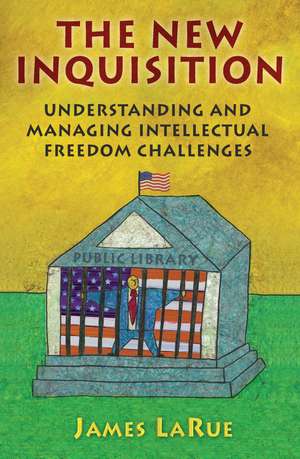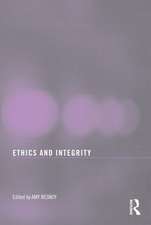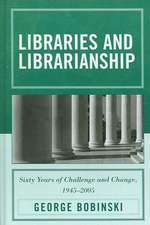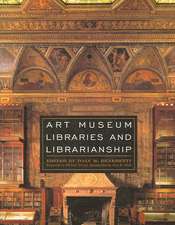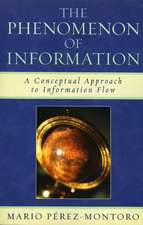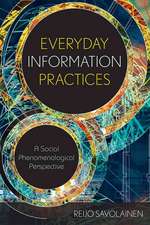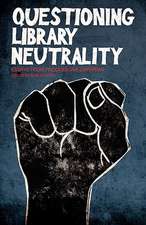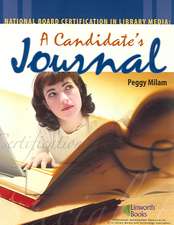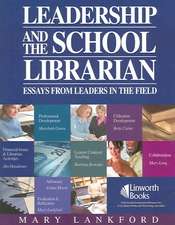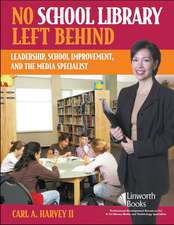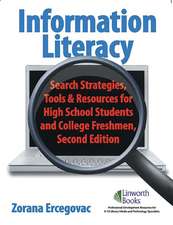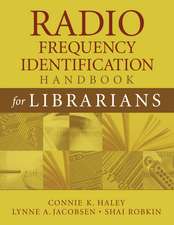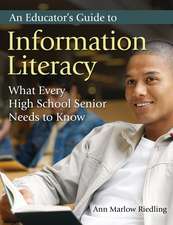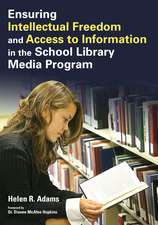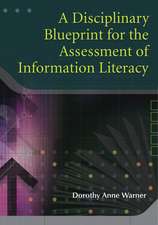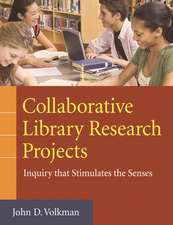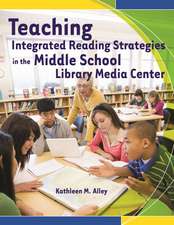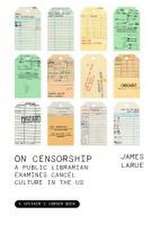The New Inquisition: Understanding and Managing Intellectual Freedom Challenges
Autor James LaRueen Limba Engleză Paperback – 29 apr 2007 – vârsta până la 17 ani
Preț: 229.32 lei
Preț vechi: 296.31 lei
-23% Nou
Puncte Express: 344
Preț estimativ în valută:
43.89€ • 47.65$ • 36.86£
43.89€ • 47.65$ • 36.86£
Carte tipărită la comandă
Livrare economică 22 aprilie-06 mai
Preluare comenzi: 021 569.72.76
Specificații
ISBN-13: 9781591582854
ISBN-10: 1591582857
Pagini: 172
Dimensiuni: 156 x 235 x 13 mm
Greutate: 0.27 kg
Editura: Bloomsbury Publishing
Colecția Libraries Unlimited
Locul publicării:New York, United States
ISBN-10: 1591582857
Pagini: 172
Dimensiuni: 156 x 235 x 13 mm
Greutate: 0.27 kg
Editura: Bloomsbury Publishing
Colecția Libraries Unlimited
Locul publicării:New York, United States
Notă biografică
James LaRue is Director of the Douglas County Libraries in Colorado. He is a columnist and frequent contributor to local and national publications, and frequently speaks on the topic of censorship. His awards include: Colorado Librarian of the Year (1998), the Julie J. Boucher Award for Intellectual Freedom (2000), Castle Rock Business Person of the Year (2003), and the National Council of Teachers of English/Support for the Learning and Teaching of English Intellectual Freedom Award (2004).
Recenzii
Public libraries must prepare for intellectual freedom challenges by instituting policies outlining their organizational procedure for reconsideration requests. With established policies and procedures in place, library staff can approach customer challenges with confidence and composure, while remembering to treat them the respect and dignity they deserve. The New Inquisition is recommended for all frontline library staff and highly recommended for library administrators and managers who respond to formal intellectual challenges.
James LaRue offers fresh advice on dealing with requests to pull books from public library collections. In an engaging anecdotal style, LaRue recounts numerous examples of real-life intellectual freedom challenges he has encountered during his years as director of a Colorado library system..LaRue advises preparation, but this book's most important contribution is its emphasis on the establishment of trust. LaRue;s most practical advice, and the approach that informs all aspects of this text, is, know your users...The New Inquisition is an entertaining and valuable read: LaRue's narrative voice is wholly likeable and reasonable. The book contains a good index and a short and very useful reference and resource list. It will make a good companion to other texts on the topic and is recommended for public libraries and academic libraries with a library studies program.
La Rue does what librarians do best--research. The book begins with a brief history of book censorship and moves to the origins of the Constitution and the Library Bill of Rights. With lively writing about relevant and current issues, the reader is engaged with example letters from concerned patrons provided. La Rue also includes Sample Request for Reconsideration forms and responses to past patron concerns, all of which are excellent resources for frontline librarians as well as the new generation of library students concerned about challenges to intellectual freedom.
This is a fresh, new and timely look at an old issue. LaRue puts a spirited case for dealing face-on with challenges - not being defensive, meeting the emotion, getting the tone right, offering alternatives, discussing the issues, following up the user's concerns, accepting that at times the matter will involve senior managers. Even though the context is U.S. public libraries, the issues here will translate into public libraries anywhere, and into school and children's libraries too. It is a real-life book about meeting challenges in an adult professional way.
Using his own experience, as well as his sense of humor, LaRue describes the kinds of challenges libraries typically face and the most effective ways to respond to them and even head them off. Dealing with intellectual freedom challenges may never become one of your favorite parts of the job.. [b]ut at least, armed with this book, you'll be better prepared
Reading the US Constitution periodically is a good idea, particularly while you are waiting for a special interest group bent on censorship to show up for a loud meeting. LaRue, a county-level director of libraries and therefore a battle-scarred veteran of the intellectual freedom wars, gives practical advice about resolving conflict with those who would limit access to certain information. He gives an historical perspective on the banning and burning of books, including the ever-present question of what children should be allowed to learn, the influence of certain religious and social groups, and the generation-driven aspect. With each he gives ways to find common ground and reasons to read together, and also lists ways to get the community involved in issues such as extending the network you already have, getting media involved, using your reputation and even working your way through the rubber chicken circuit.
[E]xamines the history of censorship, the fundamental role of libraries in defending freedom of information and the core documents of our profession..[a] sensible, practical approach to understanding and connecting with your community as a solid foundation to dealing with challenges.
James LaRue offers fresh advice on dealing with requests to pull books from public library collections. In an engaging anecdotal style, LaRue recounts numerous examples of real-life intellectual freedom challenges he has encountered during his years as director of a Colorado library system..LaRue advises preparation, but this book's most important contribution is its emphasis on the establishment of trust. LaRue;s most practical advice, and the approach that informs all aspects of this text, is, know your users...The New Inquisition is an entertaining and valuable read: LaRue's narrative voice is wholly likeable and reasonable. The book contains a good index and a short and very useful reference and resource list. It will make a good companion to other texts on the topic and is recommended for public libraries and academic libraries with a library studies program.
La Rue does what librarians do best--research. The book begins with a brief history of book censorship and moves to the origins of the Constitution and the Library Bill of Rights. With lively writing about relevant and current issues, the reader is engaged with example letters from concerned patrons provided. La Rue also includes Sample Request for Reconsideration forms and responses to past patron concerns, all of which are excellent resources for frontline librarians as well as the new generation of library students concerned about challenges to intellectual freedom.
This is a fresh, new and timely look at an old issue. LaRue puts a spirited case for dealing face-on with challenges - not being defensive, meeting the emotion, getting the tone right, offering alternatives, discussing the issues, following up the user's concerns, accepting that at times the matter will involve senior managers. Even though the context is U.S. public libraries, the issues here will translate into public libraries anywhere, and into school and children's libraries too. It is a real-life book about meeting challenges in an adult professional way.
Using his own experience, as well as his sense of humor, LaRue describes the kinds of challenges libraries typically face and the most effective ways to respond to them and even head them off. Dealing with intellectual freedom challenges may never become one of your favorite parts of the job.. [b]ut at least, armed with this book, you'll be better prepared
Reading the US Constitution periodically is a good idea, particularly while you are waiting for a special interest group bent on censorship to show up for a loud meeting. LaRue, a county-level director of libraries and therefore a battle-scarred veteran of the intellectual freedom wars, gives practical advice about resolving conflict with those who would limit access to certain information. He gives an historical perspective on the banning and burning of books, including the ever-present question of what children should be allowed to learn, the influence of certain religious and social groups, and the generation-driven aspect. With each he gives ways to find common ground and reasons to read together, and also lists ways to get the community involved in issues such as extending the network you already have, getting media involved, using your reputation and even working your way through the rubber chicken circuit.
[E]xamines the history of censorship, the fundamental role of libraries in defending freedom of information and the core documents of our profession..[a] sensible, practical approach to understanding and connecting with your community as a solid foundation to dealing with challenges.
